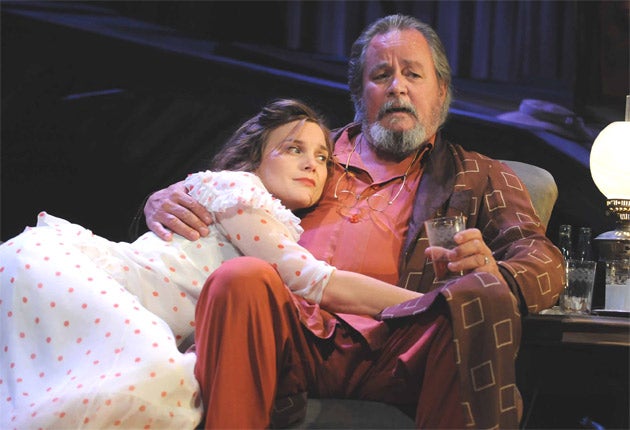Spring Storm, Royal & Derngate Theatre, Northampton

Your support helps us to tell the story
From reproductive rights to climate change to Big Tech, The Independent is on the ground when the story is developing. Whether it's investigating the financials of Elon Musk's pro-Trump PAC or producing our latest documentary, 'The A Word', which shines a light on the American women fighting for reproductive rights, we know how important it is to parse out the facts from the messaging.
At such a critical moment in US history, we need reporters on the ground. Your donation allows us to keep sending journalists to speak to both sides of the story.
The Independent is trusted by Americans across the entire political spectrum. And unlike many other quality news outlets, we choose not to lock Americans out of our reporting and analysis with paywalls. We believe quality journalism should be available to everyone, paid for by those who can afford it.
Your support makes all the difference.It's a troubling April down on the Delta, where the river is rising, and the blood too. "The crape myrtle's been out a week," says the genteel Mrs. Critchfeld. "I always start to wear white when the crape myrtle's out." Her daughter, however, worries she may never wear get to wear white and toss a bouquet. One of Tennessee Williams's high-strung beauties who are half spinster, half sexpot, Heavenly Critchfield is sleeping with the virile, shiftless Dick but tempted by the rich, repressed Arthur (a nice reversal of the traditional dilemma). The quartet of restive youth is completed by the librarian Hertha Neilson, "the most sensitive and intelligent person in Port Arthur, Mississippi", where teenagers she catches necking in the stacks laugh at her and call her an old maid.
Laurie Sansom's sensitive production, with actors for whom the parts seem to have been written, is the first in this country of this early play, which Williams wrote in 1937, when he was 26. Dick is his idol, Arthur his avatar, the poor little rich boy called a sissy because he preferred reading The Wizard of Oz to playing rough games. The bullied child is still alive in Arthur, as is Heavenly's mocking laughter, which will not die, he says, "till I possess her". Their garden games are presided over by a tiny statue of Eros – "the biggest god", says Arthur, "of them all".
The smashed clapboard house on Sara Perks's wonderful set could be the one that flattened the Wicked Witch of the East. Its tilted roof becomes a hill that the lovers climb to get away from the pettiness of a town where Hertha's kindly superiors "take every precaution to make sure I don't forget my social limitations". Williams's dialogue is full of such drawling music that slaps its penultimate syllable against your ear like lazy river water on the side of a weathered boat. It's treated very kindly by the female cast, who convey, without overemphasis, the Southern air of ostentatious languishing. Michael Malarkey's Arthur struggles so painfully with his feelings and fears that we pity him even when these lead him to assert his manhood with an act of cruelty to Hertha. Though Mrs Critchfield, an early sketch for Amanda Wingfield in The Glass Menagerie, lacks that character's intensity, Jacqueline King – always a welcome presence – gives the role plenty of fretful desperation beneath the matronly briskness.
Best of all is Liz White, angelically pretty (what a figure!) and visibly buffeted by passions for love and respectability, her body seeming clenched even when twirling and her gentle reproach – "You take the greatest delight in gettin' me aggravated"– a teasing invitation to come on and aggravate her some more. Alternating with the same cast in Eugene O'Neill's early Beyond the Horizon (another conflict between two men, a woman, and a puritanical town), this is imaginative programming that deserves a wider audience.
To 14 November (01604 624 811)
Join our commenting forum
Join thought-provoking conversations, follow other Independent readers and see their replies
Comments